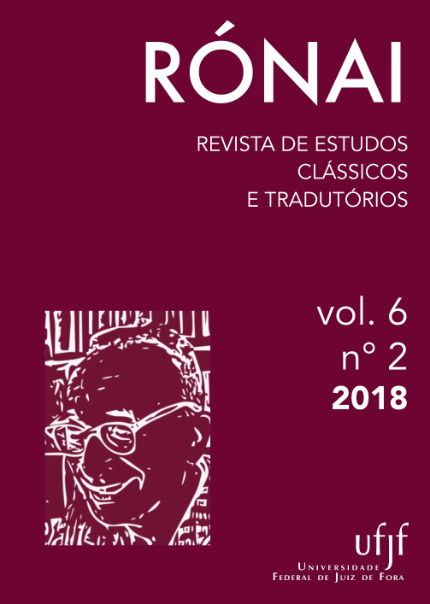The aidós of Clitemnestra: politics and power in Aeschylus' Agamemnon
DOI:
https://doi.org/10.34019/2318-3446.2018.v6.23277Keywords:
tragedy, Aeschylus, Oresteia, power relations, politicsAbstract
This article analyzes how Clitemnestra, in the Oresteia, claims the political power for itself and her relative success in face of a culture that denies this aspect to the point that she can never exercise it autonomously. There is need for a male authority: Agamemnon or Aegisthus. By eliminating the husband from whom she is subordinate, she subverts the order and contests the traditional view of power relations and blood ties. In Eumenides, the traditional view is reestablished, however, it does not respond satisfactorily to the questions that Clytemnestra raises.
Downloads
References
CHESI, G.M. The play of words – blood ties and power relations on Aeschylus’ Oresteia. Berlim: DeGruyter, 2014.
ÉSQUILO. Agamêmnon. Tradução de Jaa Torrano. São Paulo: Iluminuras, 2004.
FOLEY, H. P. Female acts in Greek tragedy. New Jersey: Princeton University Press, 2001.
HERÓDOTO. História. Trad. Mário da Gama Kury. Brasília: Editora Universidade de Brasília, 1988.
HOMERO. Odisseia. Trad. Christian Werner. São Paulo: Cosac&Naify, 2014.
POMEROY, S. B. Goddesses, whores, wives and slaves – women in Classical Antiquity. New York: Shocken Books, 1995.
ROSENFIELD, K.H. Representações da inteligência feminina na Grécia Clássica: Clitemnestra, Jocasta e Antígona. Linguagem & Ensino, Pelotas, v. 17. n.1, p. 187-214, jan./abril, 2014.
Downloads
Additional Files
Published
How to Cite
Issue
Section
License
Copyright (c) 2018 Tiago Irigaray de Bem

This work is licensed under a Creative Commons Attribution 4.0 International License.
Copyright
The authors of the published contributions agree with the following items:
1. The authors keep the copyright and convey to the journal the right of first publication, the work being licensed under a Creative Commons Attribution License 4.0 International.
2. The authors are allowed and stimulated to publicize and distribute their work online after the publication in the journal, recognizing first publication in this journal.
3. The authors of the approved works authorize the journal to distribute their content, after publication, for reproduction in content indexes, virtual libraries and similars.
For more information about Creative Commons Attribution License 4.0 International, please, go to: https://creativecommons.org/licenses/by/4.0/deed.en
Editorial exemption
The authors of the published contributions are entirely and exclusively responsible for their contents. Its content does not represent an official position of Rónai - Revista de Estudos Clássicos e Tradutórios neither of Faculdade de Letras da Universidade Federal de Juiz de Fora or their partner institutions.



